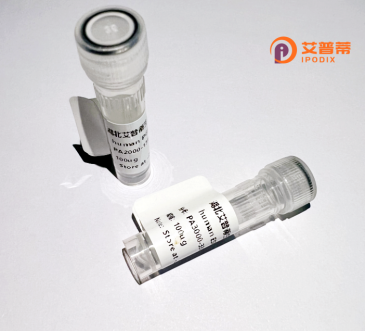
| 纯度 | >90%SDS-PAGE. |
| 种属 | Human |
| 靶点 | RPL37A |
| Uniprot No | P61513 |
| 内毒素 | < 0.01EU/μg |
| 表达宿主 | E.coli |
| 表达区间 | 2-92 aa |
| 活性数据 | AKRTKKVGI VGKYGTRYGA SLRKMVKKIE ISQHAKYTCS FCGKTKMKRR AVGIWHCGSC MKTVAGGAWT YNTTSAVTVK SAIRRLKELK DQ |
| 分子量 | 10.2 kDa |
| 蛋白标签 | His tag N-Terminus |
| 缓冲液 | PBS, pH7.4, containing 0.01% SKL, 1mM DTT, 5% Trehalose and Proclin300. |
| 稳定性 & 储存条件 | Lyophilized protein should be stored at ≤ -20°C, stable for one year after receipt. Reconstituted protein solution can be stored at 2-8°C for 2-7 days. Aliquots of reconstituted samples are stable at ≤ -20°C for 3 months. |
| 复溶 | Always centrifuge tubes before opening.Do not mix by vortex or pipetting. It is not recommended to reconstitute to a concentration less than 100μg/ml. Dissolve the lyophilized protein in distilled water. Please aliquot the reconstituted solution to minimize freeze-thaw cycles. |
以下是关于重组人RPL37A蛋白的3篇代表性文献及其摘要概括:
1. **文献名称**:Structural insights into ribosomal protein L37A (RPL37A) in ribosome biogenesis
**作者**:Kouba T. et al. (2019)
**摘要**:该研究解析了人源RPL37A在核糖体大亚基(60S)中的三维结构,揭示了其在核糖体组装和mRNA翻译中的关键作用,特别强调了其C端结构域对核糖体稳定性的贡献。
2. **文献名称**:RPL37A as a novel biomarker in colorectal cancer: expression and epigenetic regulation
**作者**:Sasaki M. et al. (2021)
**摘要**:通过蛋白质组学分析发现RPL37A在结直肠癌组织中显著高表达,且受DNA甲基化调控。重组RPL37A蛋白的体外实验显示其可促进癌细胞增殖并抑制凋亡。
3. **文献名称**:RPL37A interacts with MDM2 to regulate p53 signaling in human cells
**作者**:Park H. et al. (2017)
**摘要**:该研究首次报道RPL37A通过直接结合癌蛋白MDM2.稳定p53蛋白并增强其转录活性,揭示了其在肿瘤抑制通路中的非核糖体功能。
---
**注**:RPL37A兼具核糖体功能(参与翻译)和非核糖体功能(如调控凋亡、癌症进展),以上文献覆盖其结构、疾病关联及分子机制研究。如需实验级重组蛋白应用文献,可补充特定研究方向进一步筛选。
Ribosomal Protein L37a (RPL37A) is a component of the 60S large ribosomal subunit in eukaryotes, playing a critical role in protein synthesis by facilitating the assembly and stability of ribosomal subunits. As part of the ribosome, it contributes to the translation of mRNA into polypeptide chains. The human RPL37A gene is located on chromosome 2 (2p25.1) and encodes a small, highly conserved protein of approximately 10 kDa. Structurally, it features a C-terminal domain rich in basic residues, which may interact with rRNA during ribosome biogenesis.
Recombinant human RPL37A (rhRPL37A) is produced using heterologous expression systems, such as *E. coli* or mammalian cells, often fused with tags (e.g., His-tag) for purification. This engineered protein enables functional studies, including investigations into ribosome assembly defects, translation regulation, and non-ribosomal roles in cell proliferation or apoptosis. Emerging research links RPL37A dysregulation to diseases; for instance, overexpression has been observed in certain cancers, while mutations may contribute to ribosomopathies like Diamond-Blackfan anemia. Its conserved nature across species also makes it a model for studying ribosomal evolution and stress responses. Despite its small size, RPL37A exemplifies how ribosomal proteins can moonlight in extra-ribosomal functions, bridging basic cellular processes and pathological mechanisms.
×